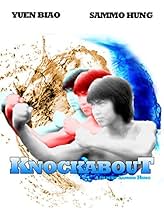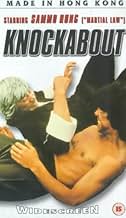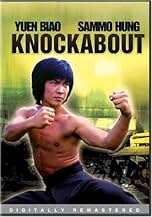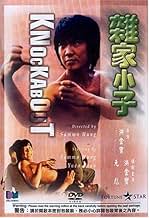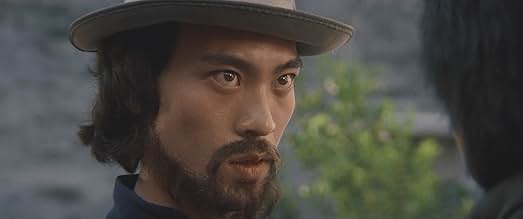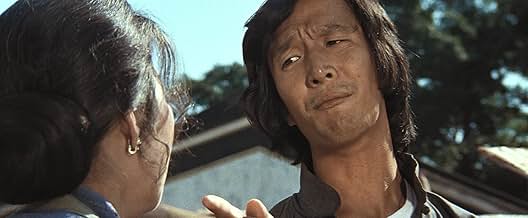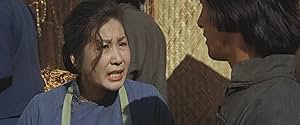IMDb RATING
7.2/10
1.7K
YOUR RATING
Two brothers and small time crooks Yipao and Taipao convince a martial arts expert to take them on as students, completely oblivious to his sordid past.Two brothers and small time crooks Yipao and Taipao convince a martial arts expert to take them on as students, completely oblivious to his sordid past.Two brothers and small time crooks Yipao and Taipao convince a martial arts expert to take them on as students, completely oblivious to his sordid past.
Ka-Yan Leung
- Dai Pao
- (as Chia-Jen Liang)
Liu Chia-Yung
- Koo Wu-Tai
- (as Kar-Wing Lau)
- …
Kuang Yu Wang
- Matchmaker
- (as Kuan-Yu Wang)
Karl Maka
- Police Captain
- (as Kar Mak)
Tin-Chi Lau
- Banker Wei's Father
- (as Tin-Chee Lau)
- Director
- Writers
- All cast & crew
- Production, box office & more at IMDbPro
Featured reviews
Yuen Biao never got the acclaim that his Peking Opera brothers Sammo Hung and Jackie Chan obtained (all part of the Seven Little Fortunes), but for martial art movie fans he is still widely appreciated. His breakout in the Hong Kong film industry was his first starring role in Knockabout in 1979. Of course, it helped that the director was Sammo Hung Kam-Bo, but Yuen's reputation was solid for his years of stunt work, being an extra and doubling actors for dangerous or acrobatic scenes (he would continue to do that after this film). This film is full of under-appreciated martial artists and performers though.
Knockabout is the fourth film directed by Sammo Hung and is one of the many hybrid Kung Fu comedies (Mo Lai Tau style) produced by Golden Harvest that were popular in the late 70's Hong Kong like Drunken Master (1978) and Hung's earlier film Enter the Fat Dragon (1978). While it was not the resounding success that Drunken Master was, it has had a resurgence in popularity the past few years.
Biao stars as Hei Yu (also called Little John in the subtitles) as a congenial con-artist with his brother Big John (Leung Kar-Yan: Warriors Two, The Postman Strikes Back) who have to cheat or steal to stay fed. After a successful scam on a cheating gold exchange cashier (working off the old adage that the best people to con are the ones who think they are conning you), they decide to gamble their profit at the local casino. They are quite unsuccessful at it and get beat up when unbeknownst to them they try to fool a gambling house with fake money. But like the consummate con-men they are, if they fail once, they will look for another mark. The new rube is an elderly man (the not-so-elderly and underrated Lau Kar-Wing who is mostly known for being the brother of Lau Kar-Leung, though he is an excellent martial artist who has appeared in many supporting roles) who is eating at the local teahouse. Their set-up fails miserably and so they set to take revenge on Jia Wu-Dao by ambushing him. Of course, he just happens to be a Kung Fu master. After they get beat up they ask him to be their sifu. He eventually acquiesces, but there seems to be something mysterious and sinister about him.
There are a few problems with the film. Karl Maka's role as the bald inspector reminds me too much of a clone of Dean Shek. The composition of the film is unbalanced. It starts mostly with comedy for the first 50 minutes and then ends heavily with action. I liked both elements, but the cohesion of the two did not quite work as a whole. The plot's biggest weakness is the inevitable turn of Jia Wu-Dao against his pupils. You knew it was going to happen, but it felt forced. And the prolific use of lifting copyrighted material for music continues with the cue for the Fat Beggar lifted from Ennio Morricone's score in The Good, The Bad and The Ugly (1966).
Luckily, there is so much to like with this movie. Biao and Leung work well together as brothers and would continue to work with Hung on later films. The portrayal of Jia Wu-Dao by Lau Kar-Wing is interesting because he is not a one-dimensional character. He cares for his adopted pupils and trains them well in martial arts (every good teacher always hides something from his students though). This makes the character change more shocking, but also makes it feel less real. I enjoyed the comedic touches like the overly flexible Yuen Biao (that is not his leg) and the ordinary men they look to beat up.
However, the best parts of the film are the training and martial art sequences in the last half of the movie. These segments are so strong that you tend to forget the somewhat meandering and mostly comedic nature of the previous scenes. The training involves some of the more masochistic devices to help, and I will not spoil them here. I will state that you get to see Biao show off his abilities with his excellent forms and most awesome somersaulting ability. The fighting scenes include an excellent team match between Seven Dwarfs (Lee Hoi-Sang: bald as usual), Snow White (Wang Kuang-Yu: The Water Margin (1972)) versus Little John and Big John. Also, I think you might enjoy the "finishing move" of Jia Wu-Dao. I am not sure I've seen much use of this professional wrestling move in Hong Kong cinema, but I have seen The Rock use it many times. Also, in the tradition of saving the best for last, you get a 12 minute fight sequence at the end that is sublime in its intestinal fortitude.
Sammo Hung was not only the director and a supporting actor in this film; he is also the action director (fans of the auteur theory should take note). His knowledge and presence help make this one of the underrated classics in martial art cinema. The competition between him and Jackie Chan during this time period helped create more intricate and daring martial art scenes for there movies. With Knockabout there is one of the best martial art movie sequences of the 70s. Knockabout is a must watch for devotees of this genre and should be a good case study for future action directors on how to choreograph. Knockabout also shows you the skill of Yuen Biao and why he should be regarded as one of the best martial art actors of the 1970s/80s.
Knockabout is the fourth film directed by Sammo Hung and is one of the many hybrid Kung Fu comedies (Mo Lai Tau style) produced by Golden Harvest that were popular in the late 70's Hong Kong like Drunken Master (1978) and Hung's earlier film Enter the Fat Dragon (1978). While it was not the resounding success that Drunken Master was, it has had a resurgence in popularity the past few years.
Biao stars as Hei Yu (also called Little John in the subtitles) as a congenial con-artist with his brother Big John (Leung Kar-Yan: Warriors Two, The Postman Strikes Back) who have to cheat or steal to stay fed. After a successful scam on a cheating gold exchange cashier (working off the old adage that the best people to con are the ones who think they are conning you), they decide to gamble their profit at the local casino. They are quite unsuccessful at it and get beat up when unbeknownst to them they try to fool a gambling house with fake money. But like the consummate con-men they are, if they fail once, they will look for another mark. The new rube is an elderly man (the not-so-elderly and underrated Lau Kar-Wing who is mostly known for being the brother of Lau Kar-Leung, though he is an excellent martial artist who has appeared in many supporting roles) who is eating at the local teahouse. Their set-up fails miserably and so they set to take revenge on Jia Wu-Dao by ambushing him. Of course, he just happens to be a Kung Fu master. After they get beat up they ask him to be their sifu. He eventually acquiesces, but there seems to be something mysterious and sinister about him.
There are a few problems with the film. Karl Maka's role as the bald inspector reminds me too much of a clone of Dean Shek. The composition of the film is unbalanced. It starts mostly with comedy for the first 50 minutes and then ends heavily with action. I liked both elements, but the cohesion of the two did not quite work as a whole. The plot's biggest weakness is the inevitable turn of Jia Wu-Dao against his pupils. You knew it was going to happen, but it felt forced. And the prolific use of lifting copyrighted material for music continues with the cue for the Fat Beggar lifted from Ennio Morricone's score in The Good, The Bad and The Ugly (1966).
Luckily, there is so much to like with this movie. Biao and Leung work well together as brothers and would continue to work with Hung on later films. The portrayal of Jia Wu-Dao by Lau Kar-Wing is interesting because he is not a one-dimensional character. He cares for his adopted pupils and trains them well in martial arts (every good teacher always hides something from his students though). This makes the character change more shocking, but also makes it feel less real. I enjoyed the comedic touches like the overly flexible Yuen Biao (that is not his leg) and the ordinary men they look to beat up.
However, the best parts of the film are the training and martial art sequences in the last half of the movie. These segments are so strong that you tend to forget the somewhat meandering and mostly comedic nature of the previous scenes. The training involves some of the more masochistic devices to help, and I will not spoil them here. I will state that you get to see Biao show off his abilities with his excellent forms and most awesome somersaulting ability. The fighting scenes include an excellent team match between Seven Dwarfs (Lee Hoi-Sang: bald as usual), Snow White (Wang Kuang-Yu: The Water Margin (1972)) versus Little John and Big John. Also, I think you might enjoy the "finishing move" of Jia Wu-Dao. I am not sure I've seen much use of this professional wrestling move in Hong Kong cinema, but I have seen The Rock use it many times. Also, in the tradition of saving the best for last, you get a 12 minute fight sequence at the end that is sublime in its intestinal fortitude.
Sammo Hung was not only the director and a supporting actor in this film; he is also the action director (fans of the auteur theory should take note). His knowledge and presence help make this one of the underrated classics in martial art cinema. The competition between him and Jackie Chan during this time period helped create more intricate and daring martial art scenes for there movies. With Knockabout there is one of the best martial art movie sequences of the 70s. Knockabout is a must watch for devotees of this genre and should be a good case study for future action directors on how to choreograph. Knockabout also shows you the skill of Yuen Biao and why he should be regarded as one of the best martial art actors of the 1970s/80s.
About half an hour into Knockabout and I was ready to award it a rating of 6; the martial arts were not particularly impressive and the comedy was routine. Half an hour later and I had changed my mind; the action had improved somewhat and the story was picking up. A 7 now seemed like a reasonable score.
By the end of the film, however, I was utterly flabbergasted: Knockabout had improved beyond belief, delivering one of the most impressive finales in a martial arts movie that I have had the pleasure to witness. I now award the movie an 8 and highly recommend it to fans of the genre.
Yuen Baio and Ka-Yan Leung play brothers Yipao and Taipao, lovable rogues who convince a martial arts expert to take them on as students. When Yipao discovers that their teacher is actually a wanted criminal, Silver Fox (Chia Yung Liu), he is attacked by his master. Taipao jumps in to protect his sibling but is killed; Yipao barely escape with his life. Seeking revenge, Yipao enlists the help of a beggar (Sammo Hung) who is a master of monkey-style kung fu, and together they take on Silver Fox in a breath-taking fight to the death.
On reflection, I now realise that the earlier, less impressive fights were deliberately underwhelming in order to show how much the brothers still had to learn. As they gain more experience, the fights get better and better, until the mind-bogglingly acrobatic ending in which Biao performs feats that need to be seen to be believed.
The training scenes with Sammo's beggar involve some of the greatest acrobatics I have ever witnessed and these alone make the film worth watching. A final battle with Hung and Biao combining their monkey kung fu skills against Chia Yung Liu's snake style rounds off a wonderfully satisfying movie experience.
Knockabout is a real treat for all lovers of old-school martial arts movies and especially fans of Yuen Baio and Sammo Hung.
By the end of the film, however, I was utterly flabbergasted: Knockabout had improved beyond belief, delivering one of the most impressive finales in a martial arts movie that I have had the pleasure to witness. I now award the movie an 8 and highly recommend it to fans of the genre.
Yuen Baio and Ka-Yan Leung play brothers Yipao and Taipao, lovable rogues who convince a martial arts expert to take them on as students. When Yipao discovers that their teacher is actually a wanted criminal, Silver Fox (Chia Yung Liu), he is attacked by his master. Taipao jumps in to protect his sibling but is killed; Yipao barely escape with his life. Seeking revenge, Yipao enlists the help of a beggar (Sammo Hung) who is a master of monkey-style kung fu, and together they take on Silver Fox in a breath-taking fight to the death.
On reflection, I now realise that the earlier, less impressive fights were deliberately underwhelming in order to show how much the brothers still had to learn. As they gain more experience, the fights get better and better, until the mind-bogglingly acrobatic ending in which Biao performs feats that need to be seen to be believed.
The training scenes with Sammo's beggar involve some of the greatest acrobatics I have ever witnessed and these alone make the film worth watching. A final battle with Hung and Biao combining their monkey kung fu skills against Chia Yung Liu's snake style rounds off a wonderfully satisfying movie experience.
Knockabout is a real treat for all lovers of old-school martial arts movies and especially fans of Yuen Baio and Sammo Hung.
After watching this the only comment i could make was that sammo hung actor, director is a damn genius I collect gallios and kung fu films and this is one of the greatest of all time easily in the top five. It starts off kind of silly the great yuen Biao in his (debut role)and the awsome Ka Yan Leung are brothers when lueng is killed by their teacher yuen gets revenge his new teacher is begger sammo they double team the master in a 15 minute duel the moves are so crisp and yuen sammo and Leung as well as the evil master Lau ka Wing are at the top of their game. this easily blows away the overrated shaw brothers films and yuen wo pings films from the same period. but you won't want to stop here,check out the Odd Couple ,The Victim Warriors Two, Blade of Fury and The Magnificent Butcher, you can thank me later.
First off, Yuen Biao is amazing, and teaming him with Sammo Hung always makes for a good movie. Fans of those two should definitely see this one. The problem here is that this film doesn't get to the good stuff until 2/3 of the way through.
The first third is mainly over-the-top goofy comedy where Yuen Biao and his brother try to work various scams on unsuspecting people. I usually like Sammo's comedies, but this part seemed to fall flat. I think that's because it tried too hard to be goofy and funny, for example the characters are constantly twitching and making silly faces.
The second third is a mix of comedy and kung fu when the brothers undertake some training. This part comes off fairly well and nicely sets up the story for a twist that takes off in the final third.
The final third of the film switches to a typical training-for-revenge story, and this part is downright great. Yuen Biao undergoes some of the best training scenes I can remember and finally gets to let loose and show his stuff. This culminates in a long fight scene with the villain that's both intense and inventive. If the whole movie was like this I'd give it a nine or ten, but it's weighed down by the first parts to end up just above average.
The first third is mainly over-the-top goofy comedy where Yuen Biao and his brother try to work various scams on unsuspecting people. I usually like Sammo's comedies, but this part seemed to fall flat. I think that's because it tried too hard to be goofy and funny, for example the characters are constantly twitching and making silly faces.
The second third is a mix of comedy and kung fu when the brothers undertake some training. This part comes off fairly well and nicely sets up the story for a twist that takes off in the final third.
The final third of the film switches to a typical training-for-revenge story, and this part is downright great. Yuen Biao undergoes some of the best training scenes I can remember and finally gets to let loose and show his stuff. This culminates in a long fight scene with the villain that's both intense and inventive. If the whole movie was like this I'd give it a nine or ten, but it's weighed down by the first parts to end up just above average.
First things first: the fight scenes in "Knockabout" are plentiful and SUPERB. Some of them are staged like elaborate comic dances - Charlie Chaplin and Buster Keaton would probably be pleased if they could see some of the gags here. In addition to his great fighting, Yuen Biao performs many admirable acrobatic feats (I doubt that Jackie Chan could ever do some of the stuff that Biao does here), and Sammo Hung moves with incredible agility for a man his size! There is also a lot of comedy in this film, which will not be to everyone's taste, as it involves a lot of mugging and twitching (as well as exaggerated sound effects and animal sounds), but there ARE some genuinely funny moments. The only problem with the film is the plodding pacing: there simply isn't enough story to support 100 minutes of running time. (**1/2)
Did you know
- How long is Knockabout?Powered by Alexa
Details
- Release date
- Country of origin
- Official site
- Language
- Also known as
- Le maître intrépide
- Production company
- See more company credits at IMDbPro
Contribute to this page
Suggest an edit or add missing content




